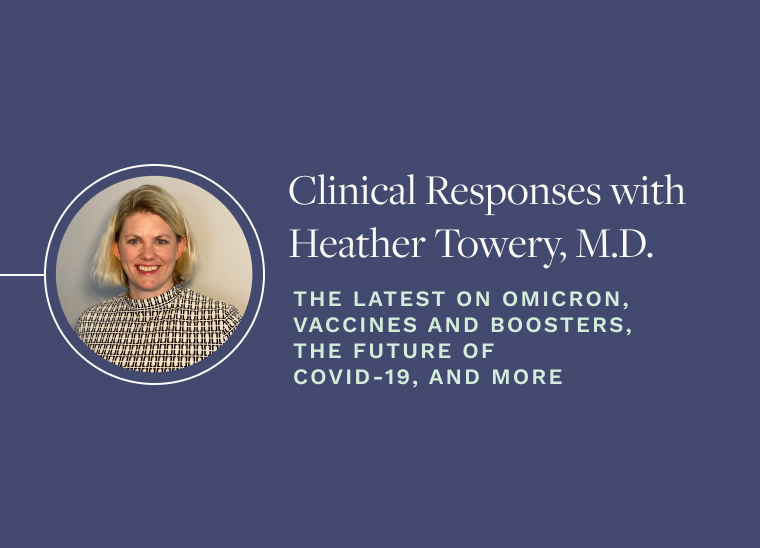We continue to provide you with the latest updates on COVID-19. This week, we’re covering:
- Omicron
- Vaccines and boosters
- OSHA ETS Supreme Court decision
- The future of COVID-19
OMICRON
Omicron has spread and continues to spread extremely quickly. The Omicron variant is the dominant variant in the United States and while it is widespread, it has produced fewer serious hospitalizations and deaths than Delta and previous strains of COVID-19. However, Omicron can still cause severe disease in the unvaccinated and in those with other risk factors such as being immunocompromised or elderly.
The current thinking is that while we are still in the middle of the Omicron surge, this surge will end in most areas of the country by the end of January or early February. You may have seen reports of some companies deciding to extend return-to-work dates for all workers until February or March, consistent with the time period scientists feel this surge will be dissipating.
While there have been a few new variants that have made the news, none of them have been labeled a variant of concern by the World Health Organization (WHO).
VACCINES AND BOOSTERS
Vaccines are still readily available across the U.S. and vaccination is encouraged even for those who have “natural immunity” from a previous COVID-19 infection to prevent severe reinfection.
Last week, the Centers for Disease Control and Prevention (CDC) updated its guidance regarding Pfizer’s vaccine. The CDC shortened the time for a booster from six months after the initial vaccine series to five months and recommended all children ages 12 and up receive a booster. The CDC also recommended that 5 to 11-year-olds who are immunocompromised receive an extra dose of the Pfizer vaccine 28 days after their second dose.
The CDC also made a distinction in their isolation and quarantine guidelines for COVID-19 depending on whether or not an individual is boosted or “up to date” on their vaccines. Any individual who is exposed after being boosted should quarantine for 5 days. If they are asymptomatic, they should then wear a well-fitted, high-quality mask for an additional 5 days.
The nuance around boosted individuals is important as we expect that boosters will soon be included in the definition of “fully vaccinated”. Given that immune systems are different and we don’t have the resources to measure each person’s antibody levels for COVID-19, the best option is to obtain a booster so that the immune system is reminded to mount a response in order to prevent severe disease and death.
OSHA ETS
Last week, the Supreme Court voted not to allow the OSHA ETS for employers with 100 or more employees to require vaccination for COVID-19 or weekly testing. By doing so, the Supreme Court will leave it up to the states and individual businesses to decide how vaccine requirements in the workplace will be addressed.
The Supreme Court allowed the vaccine mandate with no testing option for healthcare organizations that accept funds from the Centers for Medicare and Medicaid Services.
THE FUTURE OF COVID-19
It is likely that COVID-19 will be declared endemic in the next 12 months as vaccination, therapeutics, and natural immunity converge. While it is not known exactly what will happen with the virus, scientists believe COVID-19 will become part of everyday life much like the common cold and flu. It may take on a seasonal aspect, peaking in the colder months when people are more likely to be indoors due to the weather. Similarly, like the flu and other viruses, COVID-19 will continue to cause mild to moderate illness for most, but for some, it will cause serious illness and death.
The pandemic has reminded us that even basic interventions like regular handwashing with soap, and staying home when sick, slow the spread of disease. And of course, keeping ourselves healthy by eating well, sleeping well, and exercising in addition to keeping up with our annual physicals and preventive services enables our bodies to fight off illness.
The pandemic also created some new normals. For example, masking may continue to be part of our lives during peaks in virus incidence, something that is new to those of us in the U.S. but more familiar to those in the other parts of the world. It also has changed the way we administer and receive healthcare services with telehealth enabling us to be seen and treated without having to sit in a waiting room full of other people who may also be feeling unwell.
No matter what the future of COVID-19 holds, the pandemic has clearly brought renewed focus to the importance of preventive care and proactive management of chronic conditions.
Eden Health provides full-spectrum care from preventive care to acute illness to chronic conditions across physical and mental health. We’re available virtually 24/7 and offer same-day in-person appointments to address the immediate and long-term healthcare needs of your workplace. Learn more about how we can keep your workforce healthy beyond the pandemic by requesting a demo.
Authored by Heather Towery, M.D., VP Clinical Strategy and Enterprise Partnerships at Eden Health
Disclaimer: This information is based on current resources available and is subject to change. This document and its contents are provided for informational purposes only, and not intended to be, and should not be understood or treated as, a substitute for professional medical advice around COVID-19, its risks or symptoms, or to take the place of any local, state and national laws and guidelines around COVID-19. Always seek the advice of a physician or other qualified health provider with any questions you may have regarding a medical condition.





